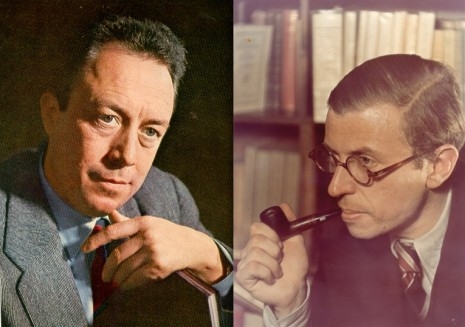
They first met through a love of theater, at a production of The Flies. It drew them together, this collective experience towards a creative good. And then, of course, their love of literature and writing, and during the war through the Resistance, and endless conversations in the cafes, which later became famous through association with their names. Jean-Paul Sartre was the leader. Albert Camus the talented writer, a leader in waiting.
Though close, there were early signs of division - Sartre knew Camus was the better writer, something he would never acknowledge publicly - and when the war finished, it wasn’t long for their friendship to fail.
Against the background of Cold War tensions and the threat of nuclear war between East and West, Sartre took the side of the Soviet Union, while Camus said he was on “the side of life”.
“I’m against a new war. To revolt today means to revolt against war.”
But it was Sartre’s blind acceptance of Russia’s concentration camps that proved too much for Camus. He wanted Sartre to denounce them, in the same way they had once denounced the German concentration camps. Sartre refused.
This led Camus to question the idea of rebellion and revolution, in particular the value of the Russian revolution, this at a time when writers on the Left held it up as the socialist dream.
In The Rebel Camus wrote:
‘In order to exist, man must rebel, but rebellion must respect the limits that it discovers in itself.
“In contemplating the results in an act of rebellion we shall have to ask ourselves each time if it remains faithful to its first noble promise or whether it forgets its purpose and plunges into a mire of tyranny and servitude.
“In Absurdist experience suffering is individual, but from the moment that a movement of rebellion begins, suffering is seen as a collective experience, as the experience of everyone. Therefore the first step towards a mind overwhelmed by the absurdity of things is to realize that this feeling, this strangeness is shared by all men, and the entire human race suffers from a division between itself and the rest of the world.”
Camus’ intention with The Rebel was to change accepted ideas about rebellion, with a new concept of questioning revolutionary action. For many it was too abstract and too damaging to the communist cause.
Sartre, therefore, decided something had to be done to redress Camus’ apparent attack on Soviet Communism, and by implication all communist belief, and he organized a damning and high-handed response. It proved to be a devastating blow to Camus.
While Sartre could separate the world of ideas from his personal friendship, Camus could not. He believed friendship was essential, and depended on his friends like the strong camaraderie shared by a theater company. Camus believed friendship united people together in the struggle for a better world. He therefore saw Sartre’s actions as the worst kind of betrayal, and it finished their friendship.
This is a short but fascinating extract examining the friendship between Camus and Sartre.